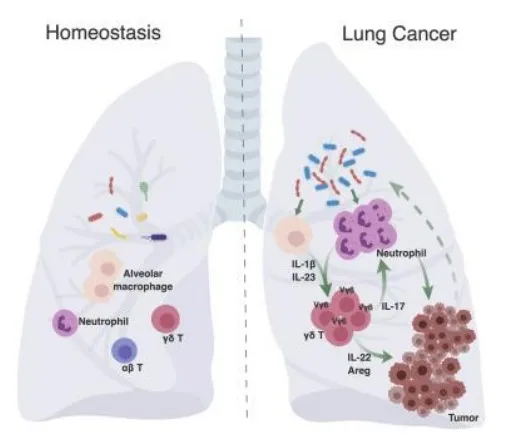Targeting Lung Microbiota and its Responding Immune Pathways for Lung Cancer Treatment
This invention offers a method for targeting commensal lung bacteria in lung cancer therapy by leveraging the interaction between host-microbiota and the progression of cancerous lung tumors.
Researchers
-
methods and compositions targeting lung microbiota and its responding immune pathways for lung cancer treatment
United States of America | Granted | 11,331,269
Figures
Technology
This technology operates by administering antibiotic treatment to deplete the microbiota within the human lung following the detection of lung cancer. The inventors have demonstrated the significance of lung microbiota in differentiating and activating tumor-associated T cells within the lung. As a result, this method offers a means to target the lung microbiota and related immune pathways for therapeutic applications in lung cancer patients. The method includes:
- Characterizing the commensal lung microbiota of a patient’s bronchoalveolar fluid using PCR analysis
- Administering an antibiotic capable of reducing bacterial load in the lung, tumor-infiltrating immune cells, and inhibiting patient’s pro-inflammatory immune cells.
The method was experimentally tested in mice for the ability to reduce inflammation and cancer cell proliferation.
Problem Addressed
Lung cancer is the leading cause of cancer-related morbidity and mortality worldwide in both men and women. Recent scientific advancements have introduced various forms of targeted lung cancer therapy; however, survival rates continue to be relatively low. Throughout their treatment, many lung cancer patients contract pulmonary infections, which have been proven to adversely affect the survival rates of lung cancer patients. Healthy lung immune cells typically maintain a state of homeostasis, ensuring immune cell surveillance against invading pathogens. However, the presence of a tumor within the lungs can disrupt this bacterial balance, leading to an increase in local bacterial burden. Consequently, this imbalance elevates the rate of lung inflammation and tumor proliferation. This phenomenon is primarily driven by the activation of resident lung T-cells, which produce pro-inflammatory cytokines that, in turn, stimulate neutrophil expression and tumor cell proliferation. This technology aims to remedy these issues by regulating the local lung microbiota to minimize the patient's inflammatory response, thereby halting further tumor progression.
Advantages
- Ability to inhibit effector molecules that promote inflammation and tumor proliferation.
- Can be paired with other targeted therapies which allows for a wide range of therapeutic options.
- Reduced inflammatory response.
Publications
Jin, C., et al. 2019. "Commensal Microbiota Promote Lung Cancer Development via γδ T Cells." Cell 176, no. 5: 998-1013.
License this technology
Interested in this technology? Connect with our experienced licensing team to initiate the process.
Sign up for technology updates
Sign up now to receive the latest updates on cutting-edge technologies and innovations.
